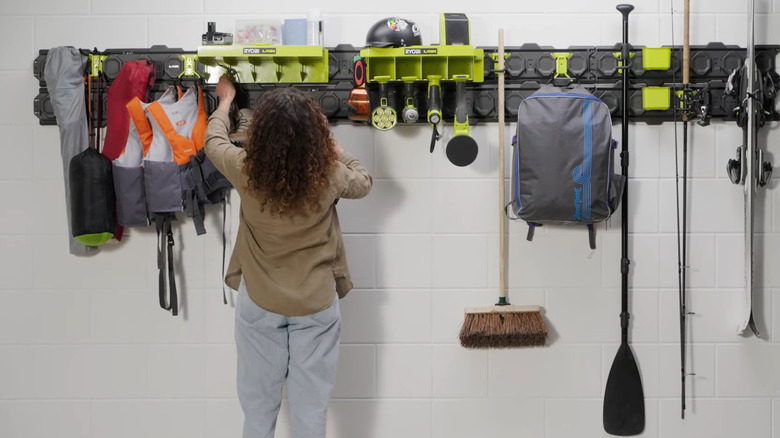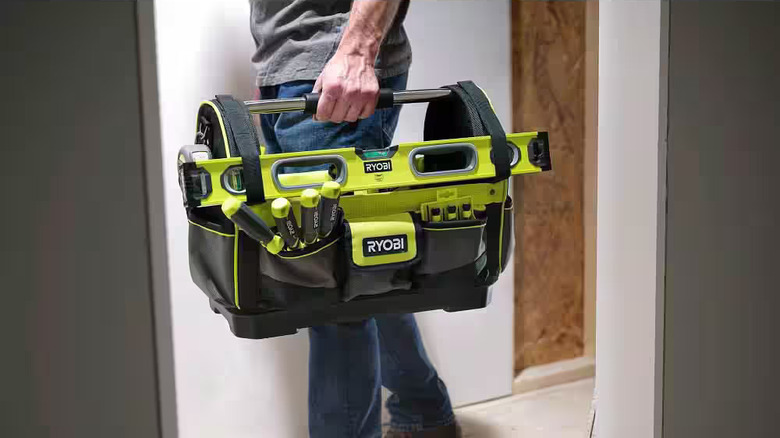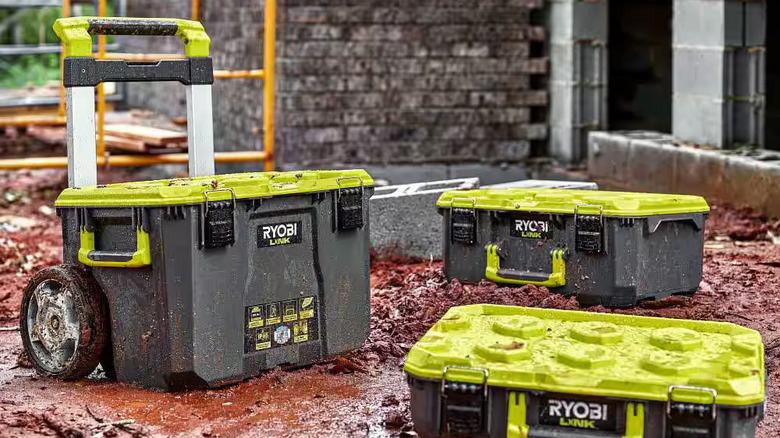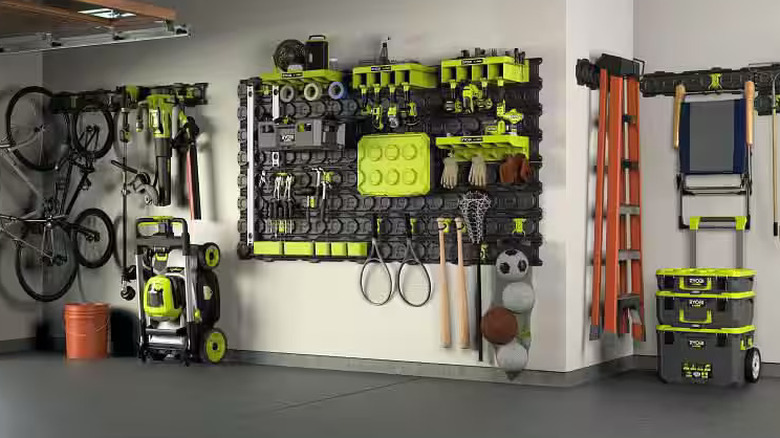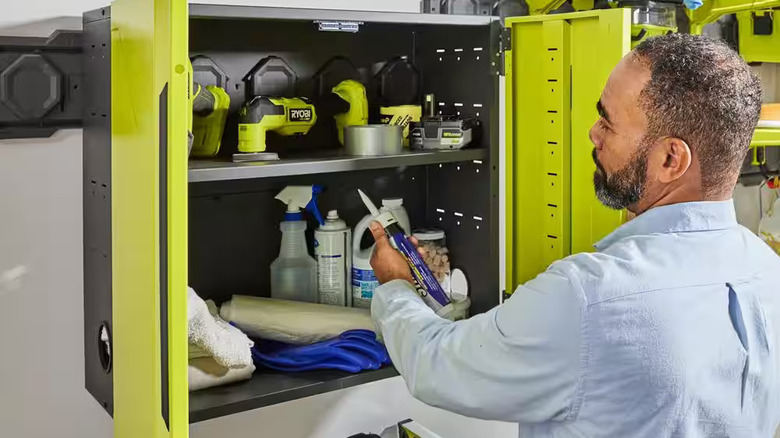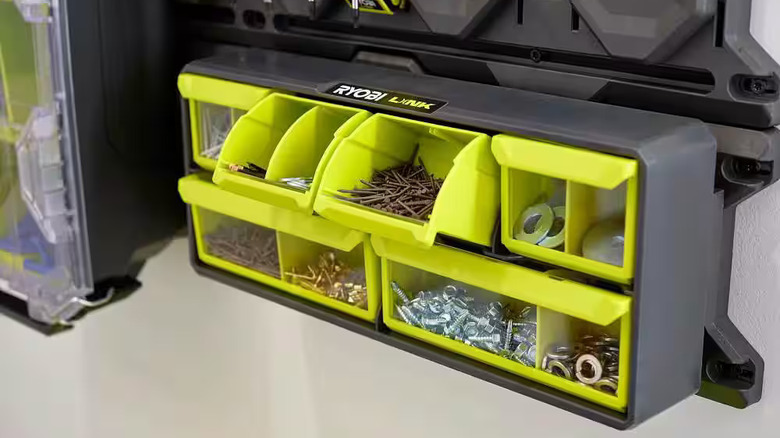If You Want To Keep Your Tools Organized, Try These Ryobi Storage Solutions
Home improvement DIYers are beset by tool storage and organization problems most others aren't troubled with. Your tools have to be portable; most DIY projects require you to work in one or two locations aside from your garage or workshop. They also have to be easily accessed, which means both that you can always put your hands on the right tool or accessory and that you can put them back in an easy-to-find location when you're done. Ryobi has jumped into the tool storage fray with a focus on modularity, a commitment to easy transport, focus on a professional approach even for DIYers, and a sometimes surprising disregard for the old ways of doing such things. And some of it is positively brilliant.
Your average shade-tree mechanic likely won't fuss too much with transport; automotive repair tools are too heavy and numerous to haul far beyond the shade tree or garage. On the other hand, a tradesperson is likely to have a truck loaded down with the kinds of things no one is likely to warehouse in a suburban garage: plumbing fittings, electrical doodads, and HVAC equipment that you'd not usually need in a home workshop. And the DIY-focused homeowner will be constantly moving things in and out of a relatively confined workspace or storage area, without the luxury of a work truck or van. Ryobi, apparently, seeks to consolidate all these needs.
Tool Bags and Totes
One of the surprising omissions from Ryobi's tool storage lineup is the simple, traditional toolbelt. This might not, at first, seem like a storage solution at all, but just a place to keep things while you're working with them, but most toolbelts hold sets of tools that you don't remove and organize at the end of the day, and then move back into the toolbelt and organize again tomorrow. Ryobi seems to have recognized this habit, but has steered away from belts and toward something more practical: the soft-sided tool bag. They can be hung and tossed about as easily as a belt full of pouches, but the tool bag acknowledges another truth of storage: You don't want to carry everything around all at once, so it makes sense to leave certain sets of tools together in a toolbox, bag, or tote.
Ryobi sells tool totes in a number of formats, including open totes in two sizes (13- and 18-inch) that come in five widths (from 6 to 15 inches) and 17 or 18 pockets, as well as larger 42-pocket totes with zippered top closures. These bags have a high denier rating (think of denier as a system for telling you how heavy duty canvas fabrics are) for abrasion resistance, as well as a molded base for structure and more durability, and padded shoulder straps. They're so handy they made our list of Ryobi products to consider even if you're not in the market for tools.
Portable Tool Boxes
If soft-sided totes have replaced toolbelts and the open toolboxes of yore, you might wonder what Ryobi's line of hard toolboxes looks like. Well, they certainly don't look anything like what your parents might have described as a toolbox. While old-school toolboxes tended to be opaque metal or plastic affairs with handles centered on the top and maybe a couple of drawers, modern toolboxes by Ryobi and other manufacturers look more like the sort of stackable, translucent storage containers you might find in a craft room. And here you begin to see how Ryobi, always committed to the DIYer, is not above forcing DIYers into a more professional mold. The idea is that handles are not enough to make a toolbox truly portable and are, in fact, woefully insufficient. You see professionals carting around equipment on wheels for a reason: It's the easiest way to get all the tools you need to the spot where you need them. And that reason applies to the homeowner as well as the tradesperson.
Carting your tools around like this might, at first, make you feel like you're catering a wedding. The modular, interlocking individual toolboxes come in various sizes and types, from large, open base boxes and carts to smaller subdivided cases to cases with drawers and even crates that work with the modular system but don't have any tops at all. These are all durable, weather-resistant, interlocking units for which you can buy foam inserts and many other accessories.
LINK Wall (and Other) Storage
You might have noticed that we've mentioned "interlocking" storage a couple of times. Or you might not have, because interlocking rolling toolboxes are fairly common these days. What's less common is Ryobi's dedication to connectivity that makes many of their tool storage solutions not just stackable vertically but often wall-mountable as well. They call their system LINK, with the apt tagline "Organize. Access. Transport." LINK applies to mobile toolboxes and other stackable elements as a sort of Lego-like connection mechanism on the tops and bottoms of things, while the wall-mounted storage solution connect to a series of short plastic rails that can be combined in many configurations, a sort of commercial analog to the Rubbermaid's FastTrack storage rails and accessories or the DIY French cleat storage systems of less single-product-focused woodworkers and mechanics.
While the mobile storage version of LINK applies to boxes, the wall-mounted version is designed to accommodate just about anything via their wall storage kits and elements like power tool holders, open cabinets, battery and other shelves, various hooks and clamps, and hooks reminiscent of TikTok's quick DIY wood brackets for genius tool storage. To help you visualize everything you can do with the system, Ryobi has an online tool for customizing your LINK system on the Ryobi website. But first we have a few more things to link together and hang on your garage walls.
Wall Cabinets
The LINK system also supports a number of Ryobi's wall-mounted cabinets, designed for storing or hiding (or both) many of the sundries of a tool and materials collection that can't or shouldn't be dangling about. In woodshops, it's a point of pride to build bespoke shop cabinets, but the average DIYer is too busy DIYing to spend much time showing off and accessorizing tools. Enter Ryobi's wall cabinets, plastic and (you guessed it) modular units that mount to LINK rails and can be combined with other LINK components into a wall of very dense tool storage.
For hiding away miscellaneous tools or toxic shop chemicals, you might opt for a couple of closed tool storage cabinets, while for frequently accessed materials like your ever-growing collection of sandpaper or wood screws you might prefer open shelves. Both types come with options like integrated slots like this DIY charging station and organizer for power tools, cord managements, repositionable shelves, and other features, all tailor-made to hold the largish and medium-sized miscellany you'd find in any garage or workshop. But what about the smaller stuff?
Small Parts Storage
Near the top of anyone's list of things that need to get organized in a garage or shop are small parts — the sorts of things a professional might stow in little individually labeled pull-out storage bins, or that an ordinary person stows in coffee cans. Screws, nuts and bolts, specialty hardware and fittings... they all proliferate in workshops, and they're all likely to get lost if you don't find a reliable way to store and retrieve them when you need them. Ryobi offers a number of solutions for this problem.
If you need your small parts on-the-go, Ryobi has compartmented toolboxes in several sizes for just this purpose. You can also buy dividers for their modular toolboxes both with drawers and without – the most cost-effective way to go if you already have the toolbox. Ryobi also offers wall-mounted parts bins of the sort you think of when picturing a well-organized professional or hobbyist's work space. Some of these solutions accentuate the one shortcoming of the Ryobi tool storage approach: the expense. At $6 per bin or $45 for a 10-compartment toolbox, it's not hard to imagine how the cost could make you less organized as you stare down (for example) a pile of screws in a wide range or sizes and with flat, pan, oval, hex, socket, and other heads (and a similar pile of bolts). So until you're ready to commit to the expense, maybe keep a few coffee cans around for a bit longer.
